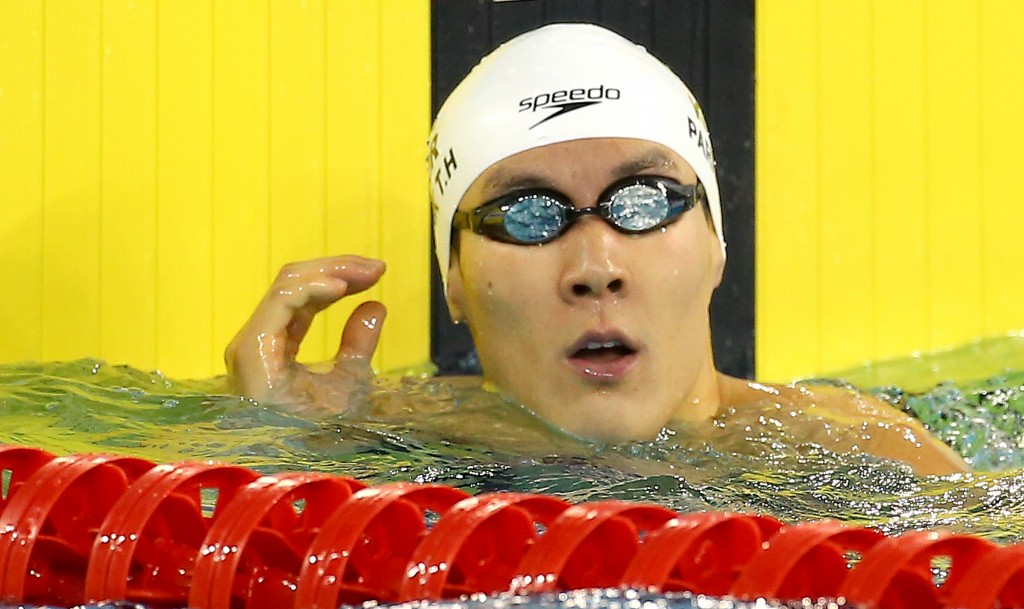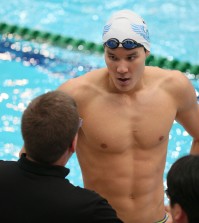- California Assembly OKs highest minimum wage in nation
- S. Korea unveils first graphic cigarette warnings
- US joins with South Korea, Japan in bid to deter North Korea
- LPGA golfer Chun In-gee finally back in action
- S. Korea won’t be top seed in final World Cup qualification round
- US men’s soccer misses 2nd straight Olympics
- US back on track in qualifying with 4-0 win over Guatemala
- High-intensity workout injuries spawn cottage industry
- CDC expands range of Zika mosquitoes into parts of Northeast
- Who knew? ‘The Walking Dead’ is helping families connect
Effort to protect Park Tae-hwan from doping allegations slipping

Park Tae-hwan checks his time after competing men’s 200-meter freestyle swimming heat at the 17th Asian Games in Incheon, on Sept. 21, 2014. (AP-Yonhap)
By Nam Hyun-woo
One week after Park Tae-hwan’s doping scandal emerged, Korea’s swimming community has united in an attempt to protect the Olympic star.
Officials from the Korean Olympic Committee, Korea Swimming Federation (KSF) and Park’s agency ― Team GMP ― held a closed meeting on Jan. 30 to discuss ways to help the 25-year-old, who has a hearing at the International Swimming Federation (FINA) set for Feb. 27.
Although very little has been said of the meeting so far, experts say the parties likely focused on reducing any disciplinary procedures against Park, rather than evading punishment altogether.
Local media has carried stories presenting Park as a victim, but it is unlikely FINA will agree with that assessment.
On Jan. 20, Park filed a suit against the clinic where he was given a shot of Nebido containing the banned substance testosterone last July. It was announced that Park had tested positive in FINA doping tests on Jan. 26; the swimmer claiming he did not know the shot contained the banned substance.
Experts say that although the clinic was liable, Park will also likely be held responsible for neglecting an athlete’s responsibility of being cautious with any medicine they take.
Team GMP’s hasty announcement on the test failure could also have a negative impact on Park. Despite FINA regulations on the confidentiality of doping tests results until the penalties are determined at a hearing, the agency released a statement on the incident to appeal to public sentiment and to hold the clinic responsible.
After its announcement, Team GMP has remained tight-lipped over the scandal, but testimonies given during the prosecution’s investigations have revealed more information.
On Wednesday, the Hankyoreh newspaper reported that prosecutors have tacitly concluded that both the clinic and Park had no intent to inject testosterone.
According to the vernacular, the prosecutors found testimony by the physician at the clinic convincing. The physician, surnamed Kim, claimed that Park had low level of male hormone and injected Nebido, but did not know it was a banned substance.
Prosecutors believe Team GMP had not requested Park’s treatment log from the clinic, which will show what kind of medicine Park has taken.
During the investigation, Kim allegedly said Park had visited the clinic “multiple times” and was also given a shot in December, 2013. The Chosun Ilbo, another local vernacular, quoted a person who introduced the clinic to Park, saying “he visited the clinic more than 10 times.”
A FINA official said Wednesday “the procedure over Park is underway in accordance with the FINA DC Rules,” adding that the result “will be informed when the Doping Panel makes a final decision.”
One of the reasons why Korea is striving to protect Park is that a lengthy FINA punishment would hinder Park making an appearance at the 2016 Olympics in Rio de Janerio. For Korea, Park is considered the country’s only medal favorite in the sport.
According to a KOC official, Park still retains qualification to be a national athlete, but if he is suspended longer than one month, he will miss the 2016 Olympics, because of a KOC regulation prohibiting an athlete whose suspension expired less than three years before the Games from being a national athlete.















Pingback: Park Tae-hwan, Korean Swimming officials meet, discuss strategies to avoid 2016 Olympic ban
Pingback: Effort to protect Park Tae-hwan from doping allegations slipping | ZwemZa
Pingback: Effort to protect Park Tae-hwan from doping allegations slipping
Pingback: Cinquain/LII | sundry folly